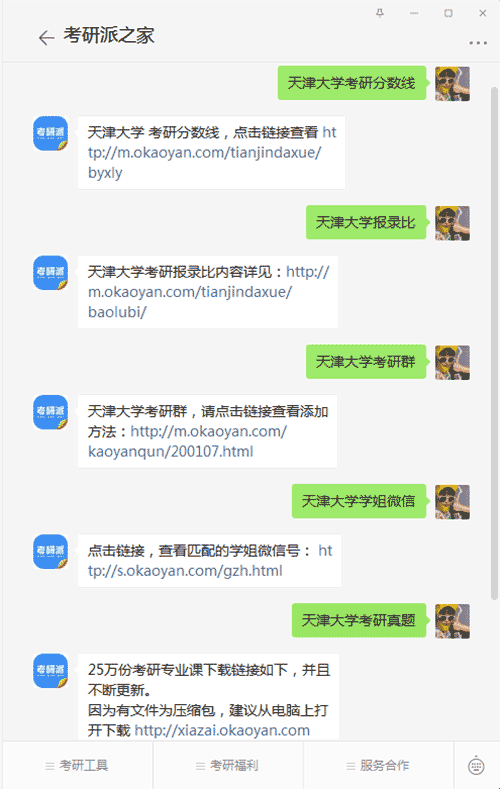发布时间:2016-07-28 编辑:考研派小莉 推荐访问:
管理科学与工程

天津大学管理科学与工程专业导师唐万生介绍的内容如下,更多考研资讯请关注我们考研派网站的更新!敬请收藏本站。或下载我们的考研派APP和考研派微信公众号(里面有非常多的免费考研资源可以领取哦)[天津大学管理与经济学部管理科学与工程专业导师:何龙飞]
[天津大学管理与经济学部管理科学与工程专业导师:高举红]
[天津大学管理与经济学部管理科学与工程专业导师:刘伟华]
[天津大学管理与经济学部管理科学与工程专业导师:安珣]
[天津大学管理与经济学部管理科学与工程专业导师:陈富赞]
[天津大学管理与经济学部管理科学与工程专业导师:窦润亮]
天津大学学姐微信
为你答疑,送资源

95%的同学还阅读了:
[2022天津大学研究生招生目录]
[天津大学研究生分数线[2013-2021]]
[天津大学王牌专业排名]
[天津大学考研难吗]
[天津大学研究生院]
[天津大学考研群]
[天津大学研究生学费]
天津大学保研夏令营
天津大学考研调剂2022最新信息
[天津大学研究生辅导]
[考研国家线[2006-2021]]
[2022年考研时间:报名日期和考试时间]
天津大学管理科学与工程专业导师唐万生介绍正文
天津大学管理科学与工程专业导师唐万生介绍:
►个人简介
唐万生
系统工程研究所教授
电子邮箱:tang@tju.edu.cn
►研究方向
不确定性决策;复杂系统建模与控制。
►教育与工作经历
1990-1993 天津大学系统工程 博士
1985-1988 南开大学运筹学与控制论 硕士
1998.12—今 天津大学管理与经济学部 教授
1993.6-1997.11 天津大学管理学院 副教授
1988.6-1993.6 天津大学系统程研究所 助教、讲师
►学术兼职
[1]中国系统工程学会理事
[2]中国运筹学会不确定系统分会理事
[3]天津自动化学会常务理事、系统工程专业委员会主任
[4]《系统工程学报》主编
►承担科研项目
[1]模糊搜寻理论及其应用(71071106),国家自然科学基金,2011年1月-2013年12月.
[2]模糊随机更新过程及其应用(70471049),国家自然科学基金,2005年1月-2007年12月.
[3]随机系统生存决策的智能化求解方法研究(70171004),国家自然科学基金,2002年1月-2004年12月.
[4]随机动态系统的生存决策理论与方法研究(79700016),国家自然科学基金,1998年1月-2000年12月.
►代表学术论文
[1]R. Zhao, W. Tang, Some properties of fuzzy random renewal processes, IEEE Transactions on Fuzzy Systems, 2006, 14(2): 173-179.
[2]Y. Liu, W. Tang, R. Zhao, Reliability and mean time to failure of unrepairable systems with fuzzy random lifetimes, IEEE Transactions on Fuzzy Systems, 2007, 15(5): 1009-1026.
[3]L. Cui, R. Zhao, W. Tang, Principal-agent problem in a fuzzy environment, IEEE Transactions on Fuzzy Systems, 2007, 15(6): 1230-1237.
[4]R. Zhao, W. Tang, H. Yun, Random fuzzy renewal process, European Journal of Operational Research, 2006, 169(1): 189-201.
[5]Y. Liu, W. Tang, Existence and exponential stability of periodic solution for BAM neural networks with periodic coefficients and delays, Neurocomputing, 2006, 69(16/18): 2152-2160.
[6]Y. Liu, W. Tang, Exponential stability of fuzzy cellular neural networks with constant and time-varying delays, Physics Letters A, 2004, 323(3/4): 224-233.
[7]J. Zhang, R. Zhao, W. Tang, Fuzzy age-dependent replacement policy and SPSA algorithm based-on fuzzy simulation, Information Sciences, 2008, 178(2): 573-583.
[8]S. Li, R. Zhao, W. Tang, Fuzzy random delayed renewal process and fuzzy random equilibrium renewal process, Journal of Intelligent and Fuzzy Systems, 2007, 18(2): 149-156.
[9]J. Zhang, W. Tang, Output feedback H∞ control for uncertain piecewise linear systems, Journal of Dynamical and Control Systems, 2008, 14(1): 121-144.
[10]F. Xue, W. Tang, R. Zhao, The expected value of a function of a fuzzy variable with a continuous membership function, Computers and Mathematics with Applications, 2008, 55(6): 1215-1224.
[11]R. Zhao, W. Tang, C. Wang, Fuzzy random renewal process and renewal reward process, Fuzzy Optimization and Decision Making, 2007, 6(3): 279-295.
[12]X. Wang, W. Tang, R. Zhao, Random fuzzy EOQ model with imperfect quality items, Fuzzy Optimization and Decision Making, 2007, 6(2): 139-153.
[13]W. Tang, X. Li, R. Zhao, Metric spaces of fuzzy variables, Computers & Industrial Engineering, 2009, 57(4): 1268-1273.
[14]T. Huang, R. Zhao, W. Tang, Risk model with fuzzy random individual claim amount, European Journal of Operational Research, 2009, 192(3): 879-890.
[15]X. Wang, W. Tang, Optimal production run length in deteriorating production processes with fuzzy elapsed time, Computers & Industrial Engineering, 2009, 56(4): 1627-1632.
[16]Q. Shen, R. Zhao, W. Tang, Random fuzzy alternating renewal processes, Soft Computing, 2009, 13(2): 139-147.
[17]C. Zhang, R. Zhao, W. Tang, Optimal run lengths in deteriorating production processes in random fuzzy environments, Computers & Industrial Engineering, 2009, 57(3): 941-948.
[18]X. Wang, W. Tang, Fuzzy EPQ inventory models with backorder, Journal of Systems Science & Complexity, 2009, 22(2): 313-323.
[19]J. Zhang, W. Tang, Output feedback optimal guaranteed cost control of uncertain piecewise linear systems, International Journal of Robust and Nonlinear Control, 2009, 19(5): 569-590.
[20]J. Zhang, W. Tang, Analysis and control for a new chaotic system via piecewise linear feedback, Chaos, Solitons & Fractals, 2009, 42(4): 2181-2190.
[21]J. Zhang, W. Tang, Control and synchronization for a class of new chaotic systems via linear feedback, Nonlinear Dynamics, 2009, 58(4): 675-686.
[22]S. Li, Q. Shen, W. Tang, R. Zhao, Random fuzzy delayed renewal processes, Soft Computing, 2009, 13(7): 681-690.
[23]P. Zheng, W. Tang, J. Zhang, A simple method for designing efficient small-world neural networks, Neural Networks, 2010, 23(1): 155-159.
[24]P. Zheng, W. Tang, J. Zhang, Efficient continuous-time asymmetric Hopfield networks for memory retrieval, Neural Computation, 2010, 22(6): 1597-1614.
[25]C. Wang, W. Tang, R. Zhao, Static Bayesian games with finite fuzzy types and the existence of equilibrium, Information Sciences, 2008, 178(24): 4688-4698.
[26]J. Wang, R. Zhao, W. Tang, Supply chain coordination by revenue-sharing contract with fuzzy demand, Journal of Intelligent and Fuzzy Systems, 2008, 19(6): 409-420.
[27]X. Li, R. Zhao, W. Tang, Similarity measures between fuzzy variables and their application to pattern recognition, Information: An International Interdisciplinary Journal, 2010, 13(1): 47-55.
[28]J. Zhang, W. Tang, A chaotic system with H?lder continuity, Nonlinear Dynamics, 2010, 62(4): 761-768.
[29]P. Zheng, J. Zhang, W. Tang, Color image associative memory on a class of Cohen–Grossberg networks, Pattern Recognition, 2010, 43(10): 3255-3260.
[30]P. Zheng, J. Zhang, W. Tang, Analysis and design of asymmetric Hopfield networks with discrete-time dynamics, Biological Cybernetics. 2010, 103(1): 79-85.
[31]P. Zheng, W. Tang, J. Zhang, Dynamic analysis of unstable Hopfield networks, Nonlinear Dynamics, 2010, 61(3): 399-406.
[32]P. Zheng, W. Tang, J. Zhang, Some novel double-scroll chaotic attractors in Hopfield networks, Neurocomputing, 2010, 73(10/12): 2280-2285.
[33]S. Li, W. Tang, J. Zhang, Optimal guaranteed cost control of uncertain stochastic complex delayed dynamical networks, Stochastics and Dynamics, 2010, 10(4): 577-590.
[34]P. Zheng, W. Tang, J. Zhang, A new chaotic Hopfield network with piecewise linear activation function, Chinese Physics B, 2010, 19(3): 030514.
[35]P. Zheng, J. Zhang, W. Tang, Learning associative memories by error backpropagation, IEEE Transactions on Neural Networks, 2011, 22(3): 347-355.
[36]Y. Liu, W. Tang, X. Li, Random fuzzy shock models and bivariate random fuzzy exponential distribution, Applied Mathematical Modelling, 2011, 35(5): 2408-2418.
[37]W. Tang, C. Wang, R. Zhao, Fuzzy parametric statistical inference, Information: An International Interdisciplinary Journal, 2011, 14(1): 17-27.
[38]S. Li, J. Zhang, W. Tang, Robust H∞ output feedback control for uncertain complex delayed dynamical networks, Computers and Mathematics with Applications, 2011, 62(1): 497-505.
[39]L. Deng, W. Tang, J. Zhang, Coevolution of structure and strategy promoting fairness in the ultimatum game, Chinese Physics Letters, 2011, 28(7):070204.
[40]L. Deng, W. Tang, J. Zhang, The coevolutionay ultimatum game on different network topologies, Physica A: Statistical Mechanics and Its Applications, 2011, 390(23/24):4227-4235.
[41]Y. Lan, R. Zhao, W. Tang, Minimum risk criterion for uncertain production planning problems, Computers and Industrial Engineering, 2011, 61(3):591-599.
[42]Y. Lan, R. Zhao, W. Tang, A bilevel fuzzy principal-agent model for optimal nonlinear taxation problems, Fuzzy Optimization and Decision Making, 2011, 10(3): 211-232.
[43]J. Zhang, W. Tang, P. Zheng, Estimating the ultimate bound and positively invariant set for a class of Hopfield networks, IEEE Transactions on Neural Networks, 2011, 22(11): 1735-1743 .
[44]P. Zheng, J. Zhang, W. Tang, Analysis and synthesis of Cohen-Grossberg networks with asymmetric connections, Connection Science, 2011, 23(3): 173-182.
[45]J. Zhao, W. Tang, R. Zhao, J. Wei, Pricing decisions for substitutable products with a common retailer in fuzzy environments, European Journal of Operational Research, 2012, 216(2):409-419.
[46]J. Zhao, W. Tang, J. Wei, Pricing decision for substitutable products with retail competition in a fuzzy environment, International Journal of Production Economics, 2012, 135(1):144-153.
[47]S. Li, W. Tang, J. Zhang, Guaranteed cost control of synchronization for uncertain complex delayed networks, International Journal of Systems Science, 2012, 43(3): 566-575.
[48]J. Zhang, W. Tang, A novel bounded 4D chaotic system, Nonlinear Dynamics, 2012, 67(4):2455-2465.
[49]J. Wang, W. Tang, J. Zhang, Approximate synchronization of two non-linear systems via impulsive control, Journal of Systems and Control Engineering, 2012, 226(3):338-347.
[50]J. Zhang, W. Tang, L. Deng, H. Gao, Control of uncertain piecewise discrete-time linear systems via state and output feedback, Transactions of the Institute of Measurement and Control, 2012, 34(5):509-519.
[51]S. Li, W. Tang, J. Zhang, Robust control for synchronization of singular complex delayed networks with stochastic switched coupling, International Journal of Computer Mathematics, 2012, 89(10):1332-1344.
[52]S. Li, J. Zhang, W. Tang, Robust H∞ control for impulsive switched complex delayed networks, Mathematical and Computer Modelling, 2012, 56(11/12): 257-267.
[53]J. Zhang, W. Tang, Optimal control for a class of chaotic systems, Journal of Applied Mathematics, 2012, 859542, 20. doi:10.1155/2012/859542.
[54]L. Deng, J. Zhang, W. Tang, W. Zhang, Effects of some topological ingredients on the evolutionary ultimatum game, Communications in Theoretical Physics, 2012, 58(3):349-358.
[55]L. Feng, J. Zhang, W. Tang, Optimal inventory control of perishable products with inventory-level-dependent demand, Information: An International Interdisciplinary Journal, 2012, 15(8):3323-3332.
►所获奖项
[1]荣获天津市第五届青年科技奖
[2]荣获天津市自然科学三等奖
添加天津大学学姐微信,或微信搜索公众号“考研派之家”,关注【考研派之家】微信公众号,在考研派之家微信号输入【天津大学考研分数线、天津大学报录比、天津大学考研群、天津大学学姐微信、天津大学考研真题、天津大学专业目录、天津大学排名、天津大学保研、天津大学公众号、天津大学研究生招生)】即可在手机上查看相对应天津大学考研信息或资源。


本文来源:
http://m.okaoyan.com/tianjindaxue/daoshi_37501.html 




































